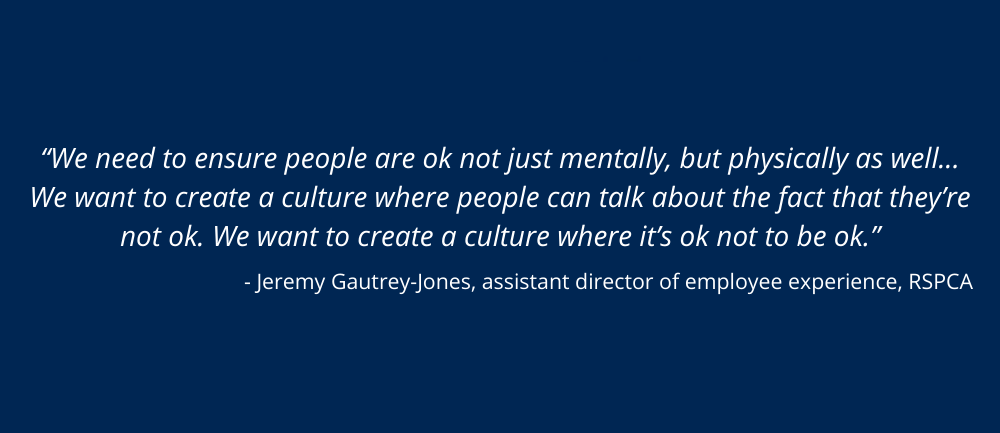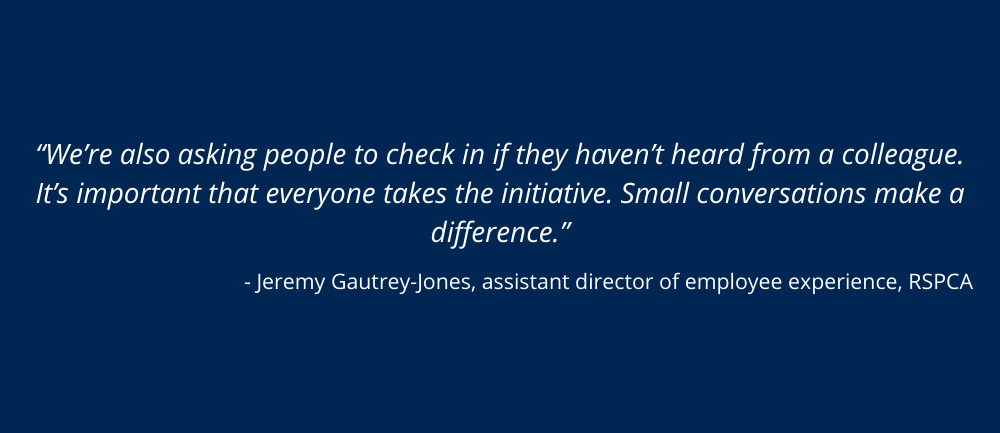-
Provided by

- Date published: Oct 28, 2021
- Categories
The RSPCA was founded in 1824 and is the oldest and largest animal protection organisation in the world. During the Covid-19 pandemic, the charity has also taken major strides to protect its human employees.
A trauma risk management process (TRiM) has been established to help staff deal with distressing images and incidents, and protect their long-term wellbeing at a time when many team members are already dealing with the stress of isolation and new ways of working.
Here Jeremy Gautrey-Jones, the RSPCA’s assistant director of employee experience, talks us through the programme and the role it will play in the charity’s long-term wellbeing strategy.
For employees of the RSPCA, shock and grief are all too common. The charity’s personnel regularly witness scenes of extreme cruelty, both when they’re out in the field responding to calls and back in the office, processing images from distressed members of the public.
Since the Covid-19 pandemic began 18 months ago, this emotional burden has only increased. The RSPCA’s Horsham headquarters has always provided a fulcrum of support and empathy, but now many staff are working remotely and having to process trauma on their own.
Addressing the issue
However, there is now a service that reaches out to every single team member, no matter where they are based and what they have witnessed. The RSPCA has established a Trauma Risk Management (TRiM) process, based on a combination of peer-to-peer support and dedicated professional support. The early results are hugely encouraging.
“Our people can come across horrific things,” explains Jeremy Gautrey-Jones. “They may find animals in horrendous circumstances and there may not be much they can do to bring the animal back, so the animal may have to be put down.
“Those events can be very difficult, especially if you love animals. Even people in our press team that see some of these horrendous photos can be quite affected by them.
“But we’ve provided that intervention, and found that it’s been really welcomed by staff. And the early numbers are good, too.”
The TRiM programme is just one of the policies the RSPCA has established to protect its staff. As the world’s most recognisable animal charity, it has earned global acclaim for its efforts to protect cats, dogs and other species from mistreatment. Now, more than ever, it is having to consider the welfare of its people, too.
Jeremy, who joined the RSPCA only a few days before the pandemic broke, explains that the organisation was “quite old-fashioned” before Covid. The head office housed over 400 people, all locked together in a presencial, 9-5 environment.
However, the new world of remote working is now firmly established. Most people have been working from home for the last 18 months, and according to a survey carried out last November, which received a response rate of over 90% from office-based staff, over eight in 10 said they wanted to continue telecommuting.
Devising a solution
Acting on this response, Jeremy and his colleagues have mapped out a strategy labelled ‘Hello Hybrid’. Beyond the core stretch from 10am to 3pm, staff are free to decide when and where they work. While the people leads recommend a minimum of one day in the office per month, there are now firm directives on location. A desk-sharing trial is underway, using a booking form created especially for the purpose.
This new approach has provided a catalyst for opportunity. The main Horsham office has been reconfigured; new collaborative spaces and shared neighbourhoods, based on job function, have been introduced to break down silo working. Dedicated dog spaces have been created for staff, so they can bring their companion animals into the office (“having dogs in the office increases many people’s wellbeing”), Jeremy explains.
At the same time the RSPCA is about to open a new flagship office in London. This new base will capitalise on the new, distributed working possibilities afforded by hybrid working, widening the charity’s catchment area and attracting a more diverse workforce.
But there are challenges, too. And no challenge is bigger than the mental health of individual team members.
“Our biggest concern was the wellbeing of staff,” Jeremy says. “It wasn’t just the working from home, it was the isolation, the screen time, the boundaries between work and home life, and how those boundaries have been blurred.
“There’s the feeling of isolation that some people had, but also the need to adapt to working on a kitchen table. Some people have missed human contact.”
To meet this challenge, the people leaders have created a series of directives for managers. In amongst the specific directives around flexible working (such as an instruction not to “beach-towel” desks in the office) the new Hello Hybrid guidance documents impose a series of specific requirements on individual team leaders.
In total, there are seven core requirements. Managers must be clear on expectations, understand the needs of their people around flexibility, make time for regular 1:1s, include everyone in their communications, provide updates on location, ask rather than assume and be sure to “switch off” which means they themselves must look after their own wellbeing.
To back up these new instructions, managers can now receive dedicated training on how to manage hybrid staff. This is backed up by dedicated mental health awareness training for line managers, enabling them to spot the signs of burnout and other wellbeing risks and, just as importantly, give their people the freedom to talk about their symptoms.
“We need to ensure people are ok not just mentally, but physically as well,” Jeremy says. “And we want to create a culture where people can talk about the fact that they’re not ok. We want to create a culture where it’s ok not to be ok.”
A whole raft of initiatives have been introduced to enable staff to share their struggles. A wellbeing cafe was run at the start of the pandemic, and support guidance has been issued to staff. A counselling service is on hand for those who need it, and each team member is urged to take responsibility for checking in with colleagues who are working remotely.
“It can literally be a ‘how, how are you today’ kind of check-in once a day, but we’re also asking people to check in if they haven’t heard from a colleague,” Jeremy explains. “It’s important that everyone takes the initiative. Small conversations make a difference.”

But the most eye-catching pillar of the RSPCA’s new wellbeing strategy is the TRiM programme. The idea has already been rolled out by the police, coastguard, NHS and other first-line responder organisations. Now, the RSPCA is extending the concept to the field of animal protection.
TRiM begins with a request for help, either from an individual or their teammates. This triggers a risk assessment, a confidential peer-to-peer process in which the affected individual is interviewed by one of their colleagues who has been trained for the role of TRiM practitioner.
This assessment provides a kind of triage service and a way of flagging traumatic incidents; according to the RSPCA’s own definition, a traumatic incident is “any event that can be considered outside of an individual’s usual experience and causes physical, emotional or psychological harm.” The incident does not necessarily have to be work-related; a TRiM assessment could be carried out if, for example, a staff member witnessed a road traffic accident while off-duty.
Following the initial conversation the TRiM practitioner will complete a TRiM Risk Assessment form, which acts as a guide to how the individual is processing the scenes they have witnessed. If the incident is deemed serious enough, the individual will be signposted towards appropriate support services such as the Employee Assistance Programme or Occupational Health. Employees can have up to six counselling sessions for a personal issue but more if it’s work-related.
Speed of assessment is key. As Jeremy says, “it’s clinically shown that if you have an intervention via risk assessment within 72 hours of a traumatic incident, you can put in place support mechanisms to prevent a serious mental health issue developing.”
However, this places a premium on care and accuracy, on the ability to tease out the right insights under pressure. Each TRiM practitioner has been carefully selected and given their own dedicated training. Candidates have been drawn from across the business, from animal centres to the society’s HQ.
“We’ve recruited 16 practitioners in total”, Jeremy explains, “and we advertised via an open application process. We looked for empathy, good listeners, and we were over-subscribed. That’s pretty impressive, when you consider that these people are going above and beyond their normal work.”
The training was provided by March on Stress, a consultancy that specialises in peer support and psychological first-aid training. Over the course of two days, the chosen TRiM practitioners were educated in ethical procedures, listening techniques, ways to offer assistance and methods of scoring levels of post-traumatic stress, so they could identify those who needed onward referral to professional support.
“We’re not training our people to be specialists in mental health, ” Jeremy continues, “we’re training them to provide that initial assessment to determine whether the individual needs to be assessed by a professional.”
The whole process is designed to be as discreet as possible. Any paperwork created during the assessment is destroyed as soon as it is over; the only record left of the meeting is a score and the individual’s name.
After the assessment, the TRiM Coordinator will keep a basic record of the person(s) who have attended, which will not be shared with anybody else. The assessment is treated as a peer review service rather than a medical intervention, and thus it does not form part of the individual’s personnel record. A record will only be created if the individual is referred to Occupational Health.

Jeremy stresses that the TRiM programme was not created as a result of Covid-19; it was something he and others had witnessed in previous organisations and were keen to introduce to the society.
Nonetheless, the initiative has provided a major source of support for staff during the last few months and has already begun to show positive results. Around three staff use the service each month on average, and the RSPCA national society are now getting requests to roll out the service to their national branches.
“We’ve seen statistics from organisations that are well-established with this service and we’re told [the month average] is a good number,” Jeremy says, adding that “a lot of the responses say that this is great, and we wish we’d had this earlier.”
With pet ownership soaring to record heights during the pandemic, it seems sadly inevitable that instances of abandonment and cruelty will increase – and so the RSPCA’s new service will remain hugely important, even as the strains of lockdown eases. The society may be nearing its 200th birthday, but the establishment of the TRiM programme shows it remains as innovative and forward-thinking as ever.


